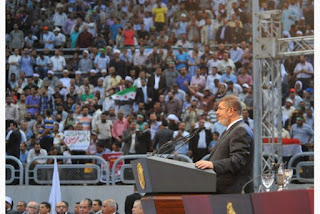Egypt’s Morsi turns to Syria and soccer to polish his tarnished image
President Morsi announces rupture with Syria in Cairo stadium
By James M. Dorsey
Egyptian President Mohammed Morsi and his flailing Muslim
Brotherhood have turned to foreign policy and soccer to improve their battered
image in advance of a planned mass anti-government protest at the end of this
month and mounting calls for his resignation.
In a bid to distract attention from his domestic woes, curry
favor with the United States and Gulf countries and restore Egypt to a
leadership position in the Middle East and North Africa, Mr. Morsi chose a
Cairo stadium to announce to his rallied supporters that he was cutting
diplomatic ties with the regime of embattled Syrian President Bashar al-Assad.
The president’s ruling Muslim Brotherhood at the same time
said it would field candidates for the board elections of storied Cairo soccer
club Al Zamalek SC and other major football teams. The move is an effort to gain
control of clubs in a soccer-crazy country whose huge fan base played a key
political role in and since the toppling of Hosni Mubarak two years ago.
The fans, one of the largest civic groups in Egypt, are
likely to participate in a mass opposition Tamarod (Rebel) march on the
presidential palace scheduled for June 30, the first anniversary of Mr. Morsi’s
inauguration as Egypt’s first freely-elected post-revolt leader, to demand his
resignation and early elections. Egyptian media report that a petition calling
for Mr. Morsi’s resignation has so far attracted 15 million signatures, two
million more than the 13 million votes the president garnered a year ago. A
significant number of militant soccer fans are believed to be among the
signatories.
Criticism of Mr. Morsi has mounted in the past year as a
result of his failure to halt Egypt’s stark economic decline, his haughty
leadership style that many believe harks back to Mr. Mubarak’s authoritarianism
and his perceived efforts to Islamize Egyptian society.
Militant, highly politicized, well-organized and street
battle-hardened soccer fans have in the last year played a key role in protests
against Mr. Morsi. The conviction to death of soccer fans and perceived
leniency towards security personnel in a trial earlier this year against those
responsible for the death last year of 74 fans in Port Said in a politically
loaded brawl sparked a popular uprising in Suez Canal cities and violent protests
in Cairo.
Prominent Egyptian artists, writers, actors, filmmakers and
intellectuals camped out in front of the culture ministry in Cairo to demand
the resignation of Minister Alaa Abdel-Aziz because of his alleged efforts to
force the arts to conform to Islamic conservatism called last week on the
militant soccer fans to protect them against attacks by supporters of Mr.
Morsi.
The Brotherhood’s intention to increase its influence in
soccer clubs, many of which are financially troubled as the result of long
suspensions sparked by Egypt’s political turmoil since 2011, is the movement’s
latest effort to come to grips with the country’s most popular pastime.
Brotherhood officials initially toyed with the creation of their own soccer
clubs but then opted for a promise to clean the sport of corruption, including
the replacement of Mubarak-era officials.
Zamalek coach Jorvan Vieira warned last month that “despite
not getting their salaries, the players do their best in the matches. The
management must solve the problem as I can't ask them to play while they are
losing their concentration."
While Mr. Morsi’s breaking off of relations with Syria strikes
a popular cord among Egyptians who are largely abhorred by Mr. Al-Assad’s
brutal crackdown on his opponents, his attempt to gain control of soccer clubs risks
backfiring against the backdrop of mounting calls for his resignation.
Islamists hardly endeared themselves to soccer fans by recently
suggesting that their rivalries were a Zionist plot to destabilize Egypt. Al
Hafiz TV, a Salafi television station critical of Morsi that promotes a return
to the 7th century lifestyle of the Prophet Muhammad and his
immediate successors made the insinuation by airing a video portraying an alleged
ultra-Orthodox Jew as advocating the instigation of strife between various
groups in Egypt, including soccer fans.
Gamal Abdallah, a member of the Brotherhood’s sports
committee, announced the movement’s intention to gain control of clubs on the
website of the group's political arm, the Freedom and Justice Party. "The
group is considering fielding candidates or endorsing certain contenders in
some posts during Zamalek's board of directors election… The group also intends
to take part in all club elections in the coming period," Mr. Abdallah
said.
The Brotherhood is likely to back Mortada Mansour, a lawyer
and Brotherhood supporter, who is challenging incumbent Zamalek chairman Mamdouh
Abbas, a wealthy businessman, in elections scheduled for September.
Militant Zamalek fans last month interrupted a news
conference by sports minister El-Amry Farouk intended to announce new
regulations for clubs and unveil his development plans because of his dismissal
of Mr. Abbas and imposition of a temporary board in advance of the September
elections. The fans have since demonstrated and blocked roads to demand the
release of militants detained during the storming of the minister’s conference.
James M. Dorsey is a senior fellow at the S. Rajaratnam
School of International Studies, co-director of the University of Würzburg’s
Institute of Fan Culture, and the author of The Turbulent World of Middle East
Soccer blog.





Comments
Post a Comment